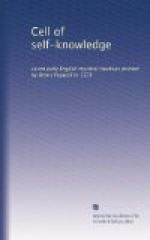As to the first, I answer and I say that I dread full much in this matter and such others to put forth my rude conceit, such as it is, for two skills.[235] And one is this: I dare not lean to my conceit, affirming it for fast and true. The other is thine inward disposition, and thine ableness that thou hast unto all these things that thou speakest of in thy letter, which be not yet so fully known unto me, as it were speedful that they were, if I should give full counsel in this case. For it is said of the Apostle: Nemo novit quae sunt hominis, nisi spiritus hominis qui in ipso est; “No man knoweth which are the privy dispositions of man, but the spirit of the same man, the which is in himself";[236] and, peradventure, thou knowest not yet thine own inward disposition thyself, so fully as thou shalt do hereafter, when God will let thee feel it by the proof, among many failings and risings. For I knew never yet no sinner that might come to the perfect knowing of himself and of his inward disposition, but if he were learned of it before in the school of God, by experience of many temptations, and by many failings and risings; for right as among the waves and the floods and the storms of the sea, on the one party, and the peaceable wind and the calms and the soft weathers of the air on the other party, the sely[237] ship at the last attains to the land and the haven; right so, among the diversity of temptations and tribulations that falleth to a soul in this ebbing and flowing life (the which are ensampled by the storms and the floods of the sea) on the one party, and among the grace and the goodness of the Holy Ghost, the manyfold visitation, sweetness and comfort of spirit (the which are ensampled by the peaceable wind and the soft weathers of the air) on the other party, the sely soul, at the likeness of a ship, attaineth at the last to the land of stableness, and to the haven of health; the which is the clear and the soothfast knowing of himself, and of all his inward dispositions, through the which knowing he sitteth quietly in himself, as a king crowned in his royalme, mightily, wisely, and goodly governing himself and all his thoughts and stirrings, both in body and in soul. Of such a man it is that the wise man saith thus: Beatus vir qui suffert tentationem, quoniam cum probatus fuerit, accipiet coronam vitae, quam repromisit Deus diligentibus se: “He is a blissful man that sufferingly beareth temptation; for, from he have been proved, he shall take the crown of life, the which God hath hight to all those that love Him."[238] The crown of life may be said on two manners. One for ghostly wisdom, for full discretion, and for perfection of virtue: these three knitted together may be cleped[239] a crown of life, the which by grace may be come to here in this life. On another manner the crown of life may be said, that it is the endless joy that each true soul shall have, after this life, in the bliss of heaven, and, sikerly, neither of these two crowns may a man take, but if




